外研版必修四 Module6 Unexplained mysteries of the natural world reading and vocabulary study 课件(共84张PPT)
文档属性
| 名称 | 外研版必修四 Module6 Unexplained mysteries of the natural world reading and vocabulary study 课件(共84张PPT) | 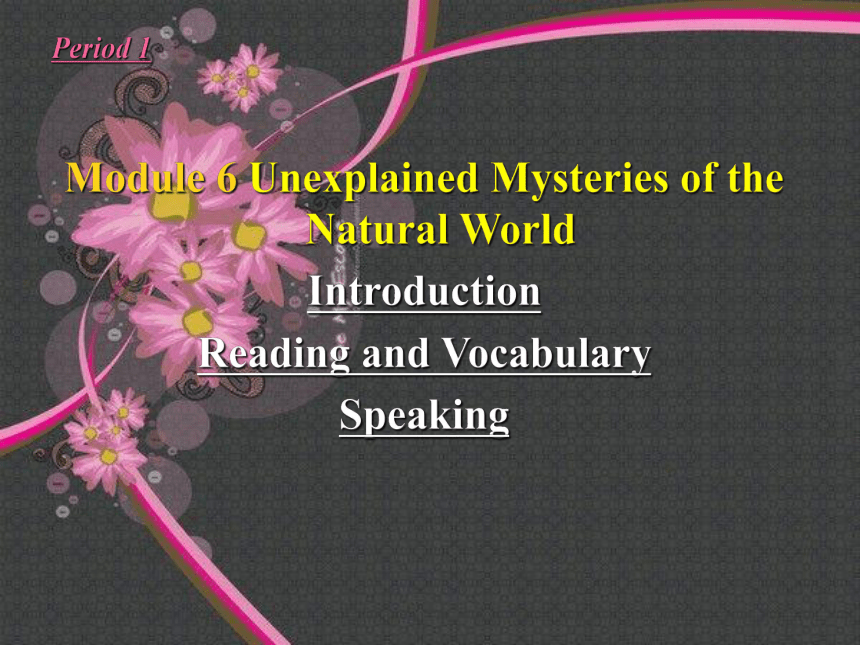 | |
| 格式 | zip | ||
| 文件大小 | 1.6MB | ||
| 资源类型 | 教案 | ||
| 版本资源 | 外研版 | ||
| 科目 | 英语 | ||
| 更新时间 | 2019-05-07 08:24:45 | ||
图片预览

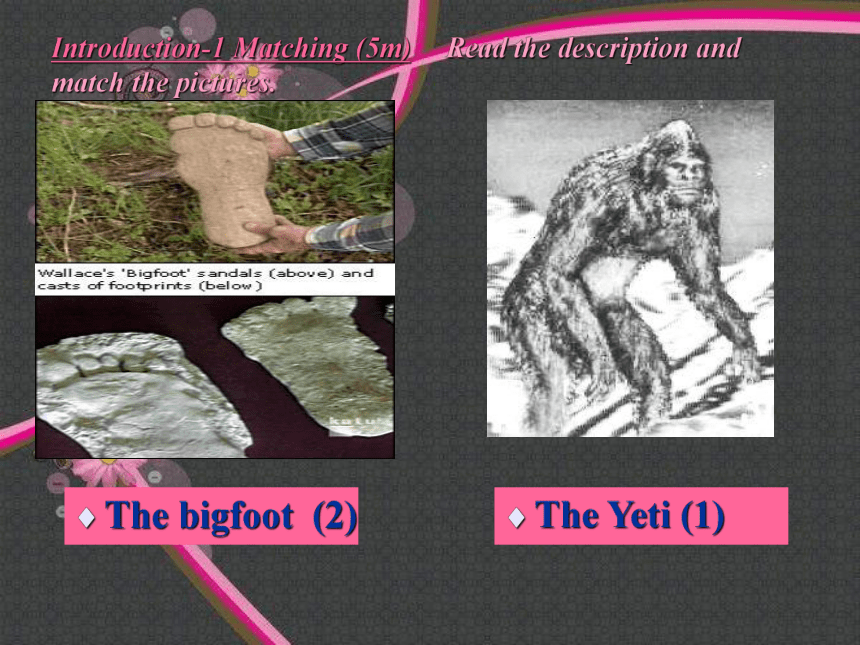
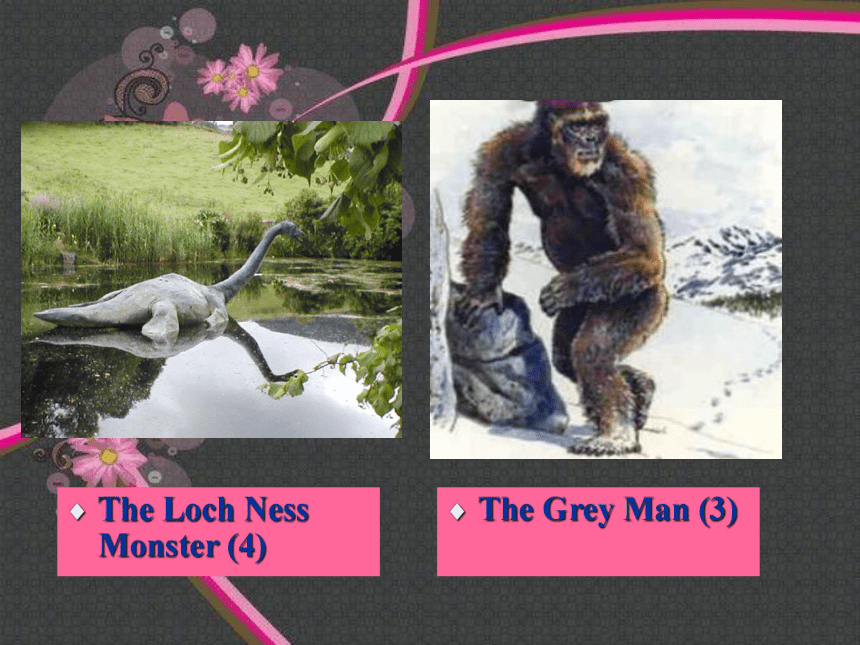
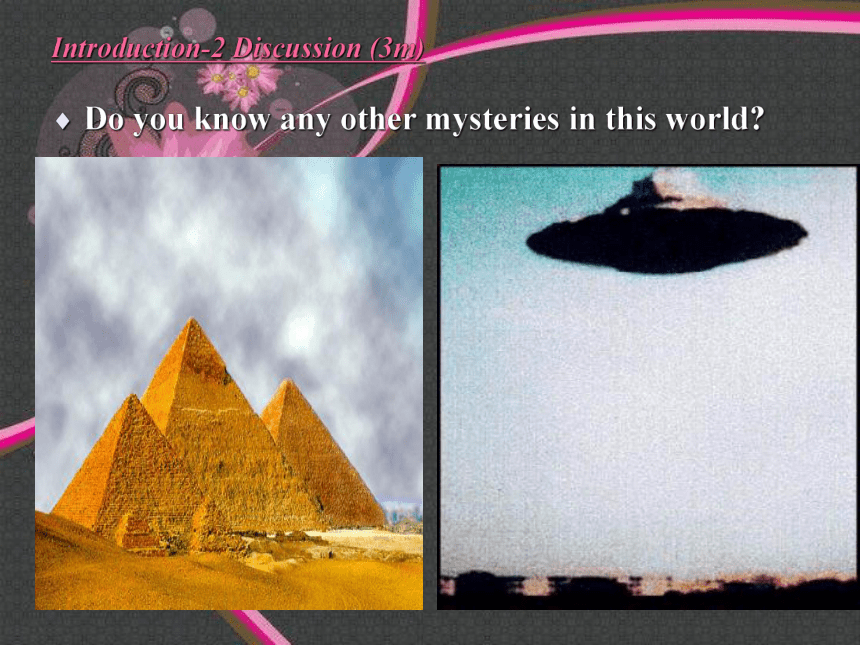
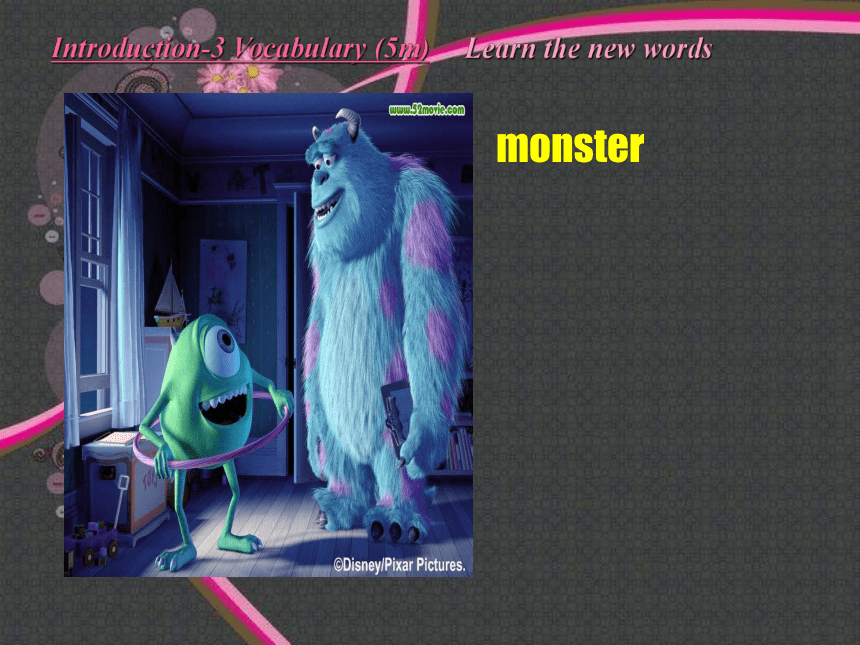
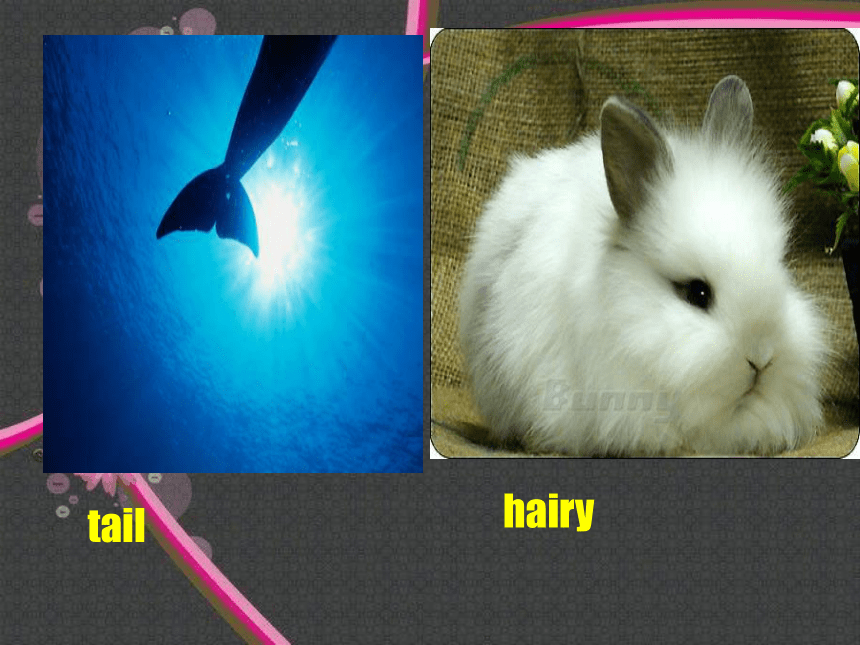
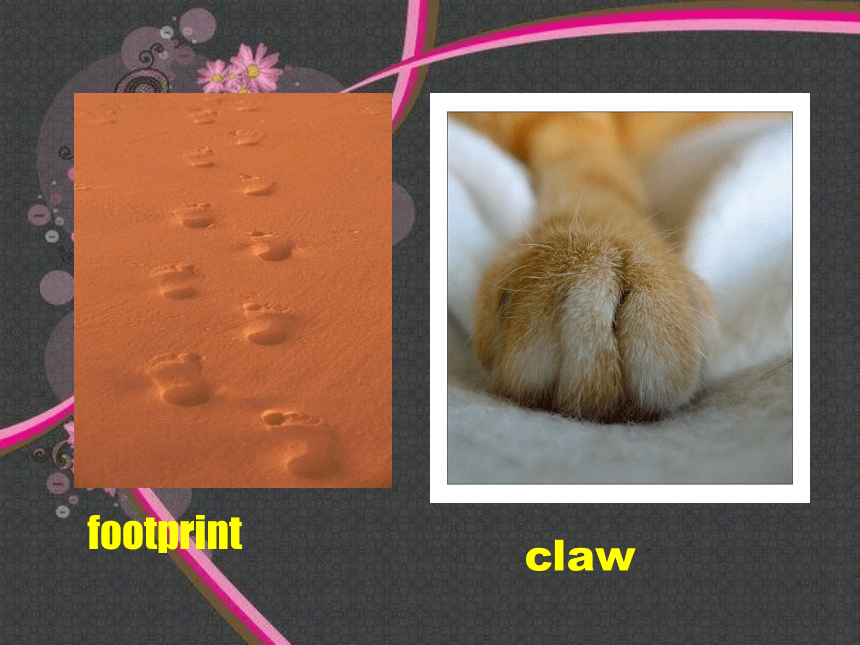
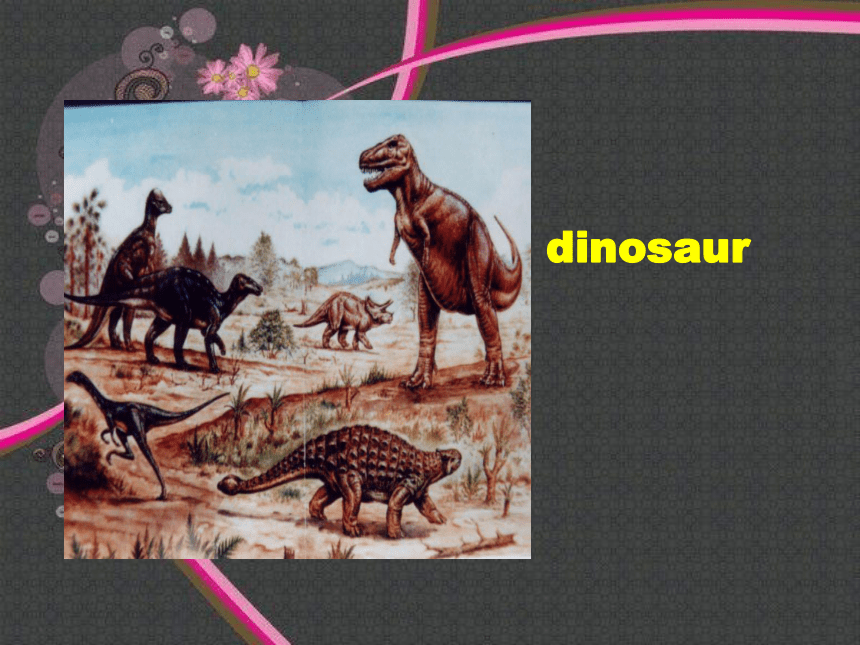
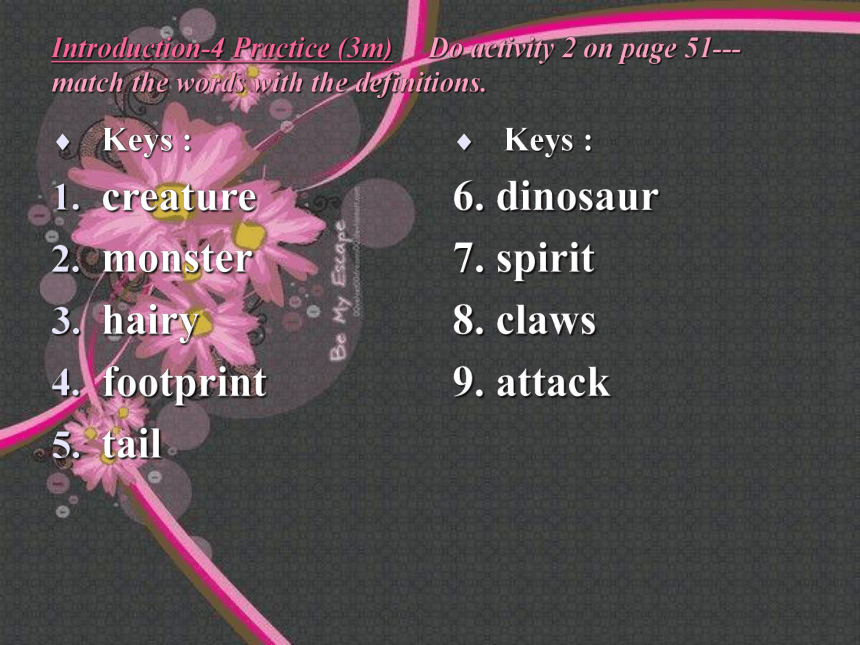
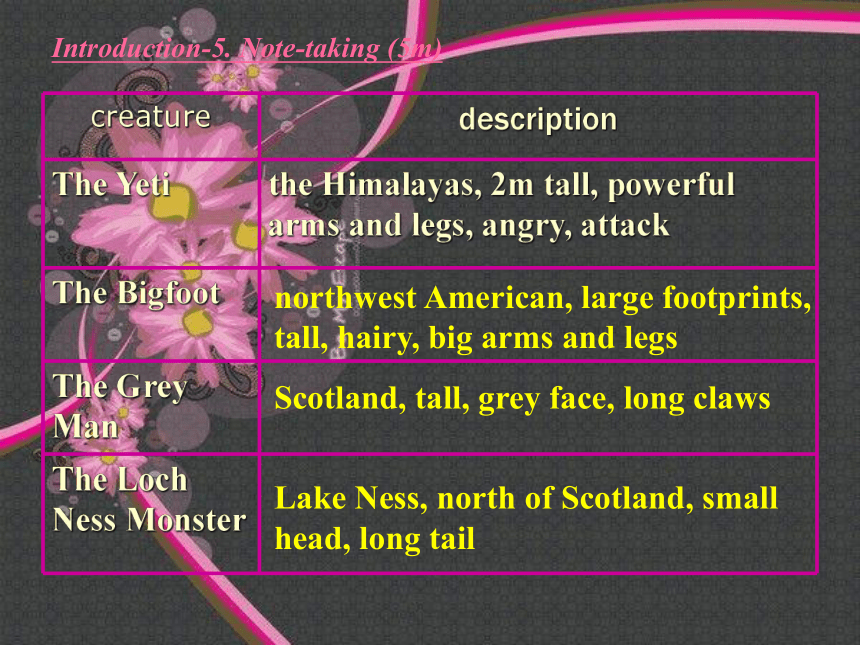

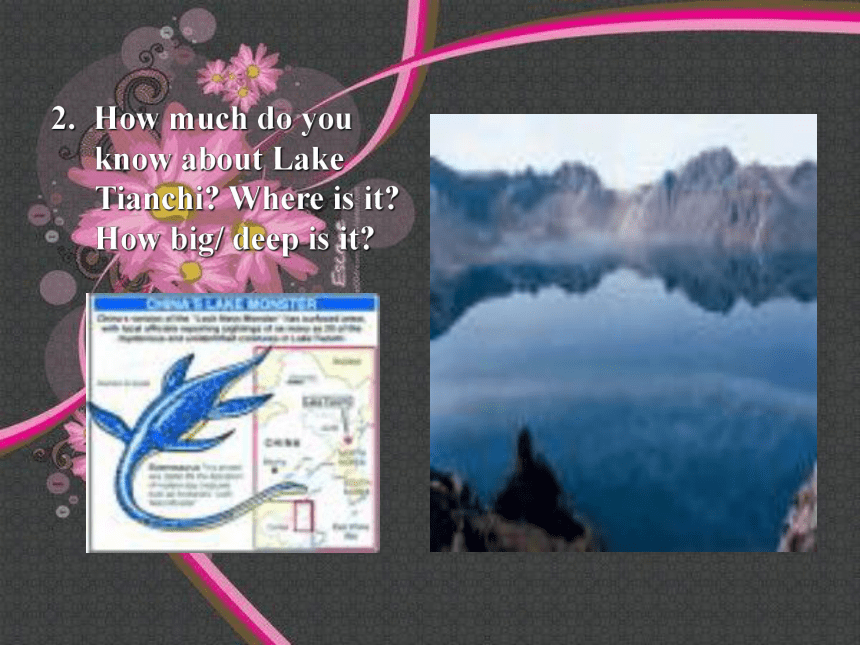
文档简介
课件84张PPT。Period 1Module 6 Unexplained Mysteries of the Natural World
Introduction
Reading and Vocabulary
SpeakingIntroduction-1 Matching (5m) Read the description and match the pictures.The bigfoot (2)The Yeti (1)The Loch Ness Monster (4)The Grey Man (3)Introduction-2 Discussion (3m) Do you know any other mysteries in this world?Introduction-3 Vocabulary (5m) Learn the new wordsmonstertail hairyfootprintclawdinosaurIntroduction-4 Practice (3m) Do activity 2 on page 51---match the words with the definitions.Keys :
creature
monster
hairy
footprint
tailKeys :
6. dinosaur
7. spirit
8. claws
9. attackIntroduction-5. Note-taking (5m)northwest American, large footprints, tall, hairy, big arms and legsScotland, tall, grey face, long clawsLake Ness, north of Scotland, small head, long tailReading & Vocabulary - 1. Warming-up (3m) Discuss the following questions.As we know, there are some unexplained mysteries in the natural world such as the Yeti, the Bigfoot, the Grey Man and the Loch Ness Monster. Have you ever heard of or read about any other monster? Tell us something you know.2. How much do you know about Lake Tianchi? Where is it? How big/ deep is it?
Reading & Vocabulary -2. Skimming (5m) Get the main idea of the passage and each paragraph.Find the topic sentence of the text
The “monster of Lake Tianchi” is back in the news after several recent sighting.Read the passage quickly and find out the main idea of each paragraph.
Para 1
Para 2
Para 3
Para 4
Para 5the latest sighting of the Tianchi monsteranother recent sighting of Tianchi monstera third sighting of the Tianchi monstermore information about the Tianchi monsterinformation about Lake TianchiReading & Vocabulary -3. Detailed -reading (10m)Read the 1st Paragraph:
According to the text, what did the monster look like?
How many people saw it?
Black in color; jumped like a seal; its head looked like a horse.About 200Read the 2nd Paragraph:
1. Who else saw the animal?
2. What were they doing?
3. What did it look like?
A group of soldiers.They were walking along the side of the lake.It was greenish-black and had a round head with 10cm horns.Read the 3rd Paragraph:
What did Li Xiaohe see?
Why could they see the animal clearly?
A round black creature moving quickly through the water. After 300 or 400 meters it dived into the water.The weather was fine and the lake was calm.Read the 4th Paragraph:
1. How long was the history of reports of monsters in Lake Tianchi?
2. What do many people think?
3. What do the scientists think?
Since the beginning of the last century.The monster may be a distant cousin of the Loch Ness monster in Scotland and there might be similar creatures in other lakes around the world.The low-temperature lake is unlikely to be able to support such large living creatures.Read the 5th Paragraph:
Information about Lake Tianchi:
Height:
Area:
Depth:
2189 m10 km2370 m deep in some placesReading & Vocabulary –4. Words-learning (5m) Guess the meaning in the box and do activity 4 on page 53.The keys:
1. A 2. A
3. B 4. B
5. C 6. A
7. A 8. C
9. C 10.Bappear calm
claim dive
horn repeat
skeptical seal
sighting
temperatureReading & Vocabulary -5.Note-taking (8m)Xue Junlina group of soldiersLi XiaoheIts head looked like a horsegreenish-black,round head with 10cm hornsA round black creatureSpeaking – Role-play (5m)Work in pairs and do the role-play.
Student A: You were one of the people who sway the monster from the top of the mountain. Think about what you saw. Answer B’s questions.
Student B: You are a journalist of an English Newspaper. You are writing an article about the Lake Tichchi monster. Ask A what he/ she saw.Homework
Find more information about the monsters or other mysteries of the nature world.
2. Finish off the exercise related to vocabulary and reading in the Workbook.Period 2Module 6 Unexplained Mysteries of the Natural World
Listening and Vocabulary
Pronunciation
Everyday EnglishListening and Vocabulary---1. Words-learning. Read the words and do activity 1 on page 55.Keys to activity 1
climate
extinct
disappear
survive
adapt
evolvePlease make some sentences with the words.Listening and Vocabulary---2. Brainstorming(3m)How much do you know about dinosaurs?
Have you ever seen any films or read any books about dinosaurs? What interests you most?
In your opinion, why dinosaurs disappeared from the earth? Give your reason.Listening and Vocabulary---3. Prediction (3m)Do activity 2 on page 56. First predict and answers, then listen and check.Keys:
C
C
C
AHow good is your prediction?Listening and Vocabulary---4. Practice (5m) listen carefully and get the detailed information.Do activity 6 on page 56. Listen carefully and decide whether the statements are true or false.Keys:
1. F 2. T 3. F 4. F
5. T 6. F 7. F 8. TListening and Vocabulary---5. Dictation (5m) listen to the tape and fill in the blanks with the the missing words. Good afternoon, and welcome to this week’s edition of ___________________. Today’s topic is a big one---it’s dinosaurs, those strange __________ which ruled the earth for no less than _________________, some of them were ______________, others were like the infamous Tyrannosaurus Rex, a carnivores who ________meat and who __________ the more peaceful plant eating dinosaurs. Mysteries of Naturecreatures200 million yearsplant eaterlived offattacked Not all dinosaurs were big --- some were the size of __________, and in fact the closest things to dinosaurs living today are actually __________. But the mystery we are going to talk about today is why the dinosaurs suddenly disappeared exactly __________________, and to throw light on the subject we’ve invited one of the world;s foremost experts on the subject, from the Pitt Rivers Museum in Oxford, Dr Roger Binfield.
chickenbirds66 million yearsListening and Vocabulary---6. Discussion (8m) How many explanations are given for the disappearance of the dinosaurs? And what are they? Which theory you think is most likely and why?Possible answers:
A meteorite hit the earth
They stopped evolving
They killed each other.
A volcanic eruption
Cancer caused by radiationEveryday English –1. Practice (5m) Guess the meaning of the following phrases and do the exercise.be back in the news
throw light on
come straight to the point
almost overnight
die out
go for
quite somethingKeys:
A
B
A
A
B
A
BHomework
Have a revision of Today’s lesson and make up some sentences with the useful expressions.
Find some information about dinosaurs.
Period 3Module 6 Unexplained Mysteries of the Natural World
Function
Grammar
Function---1. PresentationMany people think the monster may be related to Nessie.
They think there might be similar creatures in other lakes.
Scientists say the lake is unlikely to be able to support such a big creature.
Which sentences say that something is possible?
Which sentences say that something is impossible?
Which word is followed by to+verb?
1, 23unlikelyFunction---2. Summarymay 可能会,或许会
1. It may be a new species.
2. He may not be there.
might 可能 , 或许 (语气较may更不肯定)
3. His suggestion might be worth thinking about.
4. I have got a lot of books that might interest you.
unlikely 可能性不大的 (形容词)
Snow seems unlikely today.
She’s unlikely to arrive before 7 o’clock.
It’s unlikely that he got injured.
Function---3. Practice(4m) Do activity 2 on page 54.Keys:
There might still be dinosaurs somewhere.
Don’t go near the water. It may be very deep.
We are likely to see the monster.
There may be an underground river from Loch Ness to the sea.
We must help him--- he may not be able to swim.
There are likely to be lots of strange creatures in that lake.Function---4. Practice(5m) Identify the creatures, using may, might or unlikely.Grammar --1. Lead-in (3m)Answer the following questions:
Is Dr Binfield sure what caused the disappearing of dinosaurs on the earth?
Dr Binfield says ,“ The dinosaurs may have stopped evolving.” when he says this, is he sure that the dinosaurs stopped evolving?
When he says “ They might have killed each other”. Is he sure about that? What does the sentence mean?
Grammar --- 2. Presentation (3m) Read the sentences and answer the questionsThe dinosaurs may have stopped evolving, and been unable to adapt to changes in the climate.
They might have killed each other.
We use may have done or might have done to talk about _____________.
Something which happened in the past---perhaps.
Something which is impossible.
Something which may happen in the future.1Grammar ---3. Summary (2m)may+have+done”表示对发生过的事情的推测,意思是“可能已经”或“也许已经”,用于肯定句中。
—What has happened to George?
—I don't know. He may have got lost.
—乔治发生了什么事?
—我不知道,他可能迷路了。
“might+have+done”表示对过去事情的推测,might与may意思相同,但可能性更小。多用于虚拟语气结构中。
1. He might have given you more help, even though he was busy. (MET90) 他或许会多给你一些帮助,即使他很忙。
2. She might have achieved greater progress, if you had given her more chances. 如果你多给她点机会,她可能已经取得更大的成绩。 Grammar ---4. Practice (5m) Do activity 2 and 3 on page 57.Keys:
might have caused
may have cut off
may have survived
might have been killedThink of more reasons why the dinosaurs might have disappeared.Grammar ---4. Practice (5m)Make up some dialogues ,using may/ might have done.
Example:
A: Hey, you look worried. What is wrong?
B: I can’t find my wallet.
A: I guess you may have left it in your house.
B: I don’t think so.
A: or you may have put it in your schoolbag.
A: …Homework
Finish the grammar exercise in the Workbook
Have a good revision of Today’s lesson and make a summary of the use of the grammar learned today.Period 4Module 6 Unexplained Mysteries of the Natural World
Writing
Culture cornerWriting -1. Reading (6m) Read the reading passage and answer the questions. Do activity 1 on page 57.Keys:
Several groups of people saw a kind of “monster”.
In Lake Tianchi in the Changbai Mountains in Jilin Province.
It lived in the water, was black or greenish-black and some people said it had a round head and body with 10 cm horns on the head, while others said it had a horse’s head.
Open answer.Writing -2. Discussion (6m)Make up a story about another monster or mystery. Discuss in a group of 4 and write down the key points.
Give the monster / the mystery a special name.
Begin by saying what happened and where.
Describe the appearance of the monster or the phenomena.
Give an explanation or theory about the monster or the phenomena.Writing –3. Writing (6m) Extend the story and give the presentation.Suppose you are the tour guide , giving the tourist an introduction about the monster or the mystery. Your presentation should include the following points.Tell the location of the place where your explained mystery exists. Give practical information, such as a map of the area.
Say what happened there.
Describe what the monster is like or how the phenomena are.
Finish your article by giving an explanation or theory about your monster / phenomena.
Ask foreign tourists to pay a visit to the place and tell what the best time it is to go there.
Cultural Corner-1. Pre-reading(5m) (open answers)1. Do you know any dragon stories?
赑屃(必洗)鸱吻椒图貔貅蒲牢麒麟Cultural Corner-2. Intensive-reading(8m)What do Chinese think of dragons?
2. What do westerners think of dragons?
Generous, wise, unpredictable, brave, related to royal family.It is dangerous and has a negative reputation.
But the red dragon on the Welsh flag is a positive symbol.generouswiseunpredictableroyal familyintelligentbravenaturalleaderreputationdangerousredpositivestrengthnationalidentityWhy should the dragon have a different character in different part of the world?
It is due to the animals the myths grew out of.
In the west, the idea of the dragon probably came from the snake, while in China, it may have come from the alligator.Cultural Corner-3. Discussion(8m)
Do you know about any other animals that have different reputations in China and in the west? (open answers)
Cultural Corner-4. Language Study(8m)Fill in the blanks with prepositions.
1.??The dragon was closely connected _______ the royal family
2.?The emperor’s robes have a symbol of a gold dragon _______ five claws.
3.?…, but with fewer claws and _______ a different color.towithof4.? However, __________ the border of Wales, the red dragon is a positive symbol.
5.?…, but which is only seen when there is plenty of water---- a good sign _______ agriculture.
acrossforB. Find out the phrases in the passage.
1.?和……密切联系______________________
2. 根据___________________
3. 民族身份意识________________________
4. 由于___________________
5. 产生自__________________
6. 许多___________________be closely related toaccording toa sense of national identitydue tocome fromplenty ofCultural Corner-4. Language points(8m) Point out and explain some difficulties in the passage.Homework Find more information about the dragon and other animals that have different meanings in different parts of the world.
Write a story of monster or a mystery with your imaginationLanguage Date BankLanguage points for Reading Language Date Bank1. …, which seemed to be black in colour, seem + (to be) + adj./n 看起来似乎
The young man seemed to be excited today.
2. He claims to have seen a round black creature…
You seem to have got the good news.
She pretended to have seen the film.
He claimed that he had finished the work but I didn’t believe him.Language Date Bank3. There have been reports of monster in… there be 的现在完成形式:从…到现在都有”
There have been an old church in that town since long ago.
4. be angry with sb. at/about/ for sth.
因某事生某人的气
(1) I am very angry _____ them ____ letting me down.
(2)Don’t be angry __________________ the things.withfor at/about/forExerciseUseful expressions:
1.伸出;突出 __________________________
2.在…表面 ___________________________
3.声称做某事 ___________________________
4.不可能做 ___________________________
5.占有…面积 ___________________________
6.讲实话/说谎 ___________________________
7.潜入 _______________________________stick outon the surface of claim to do sth./ claim that be unlikely to do/ it is unlikely that cover an area of tell the truth/ tell a lie dive intoExercise8.灭绝; (火)熄灭 ___________________________
9.适应 ____________________________
10.帮助弄清楚;阐明某事 _____________________
11.谈正题;开门见山 _________________________
12.赞成;支持 _______________________________
13.和…密切相关 ____________________________die out adapt (himself)to / be adapted to throw light on come straight to the point go for, be for be closely connected with/ toExercise14.由于; 因..而造成 ____________________
15.接近 ________________________
16.清楚地看到 __________________________
17.对...怀疑 _____________________________
18.再次成为新闻 _________________________
19.可能有某人 ___________________________ due to / because of / as a result ofget /go close to get a clear look at be sceptical about be back in the news there is likely to be someoneExercise20.突然 __________________________
21.对…进攻 _______________________
22.在第一次目击时 _______________________
23. 不同寻常 _____________________________
almost overnightmake an attack on in /during the first sighting quite somethingExerciseTranslation
1.他很快适应了这里的气候了。
2.任何同意这个计划的人举起手。
3.自从上世纪初这种怪物已经灭绝了。
Soon he adapted ( himself) to the climate here.Whoever agrees to the plan puts up his hand.
Anyone who agrees to the plan puts up his hand.This species of monster has died out since the beginning of last centuryExercise4.由于这场大雨他不可能来这里了。
5.他声称见过这种已经绝迹了的怪物.
6.在远处我看见大火熄灭了.
He is unlikely to come here due to the heavy rain.He claimed that he had seen the species of monster that had died out.I saw the fire die out in the distance.ExerciseRewrite the sentences
It seems that he has been to America.
It appears that he has been to America.
3. It is said that the book has been translated
into English.
He seems to have been to America.He appears to have been to America.The book is said to have been translated into English.Exercise4.(1) He claimed that he hadn’t done it, but I didn’t believe him.
(2) He claimed to have met the emperor, but I didn’t believe him
→ He claimed not to have done it, but I didn’t believe him. → He claimed that he had met the emperor, but I didn’t believe it.5. (1)Can I ask you a fourth question?(2) I don’t like the two books .Can you show me
a third one? (3)The oranges are delicious . I’d like to have ____ third one because _____ second one is rather too small.
A a; a B the ; the C a ; the D the ; a6.There will be a sports meeting.There is going to be a sports meeting.There must be a sports meeting.There may be a sports meeting.There should be a sports meeting.There seems to be a sports meeting.There used to be a sports meeting.There might be a sports meeting.There is likely to be a sports meeting.There ____ going to be a large quantity of plant.There ___going to be large quantities of plant.There _____ to be a large quantity of plant.(seem)There _____to be two books and a pen on the desk.isareseemsseem _____ there likely _____ anyone to meet us at the airport?
A Does ; to be B Is ; being
C Has ; that D Is ; to beExercise:1.You must have studied English for many years, _____ you?
A. mustn’t B. didn’t
C. aren’t D. haven’t
2.You must have been told about it that day, ___ ?
A. mustn’t you B. haven’t you
C. weren’t you D. didn’t you
3.--- We didn’t see him at the lecture yesterday.
--- He _____ attended it.
A. mustn’t have B. would have not
C. couldn’t have D. needn’t have
4.----_______ he have been chosen as captain of the football team?
----- Yes, he______.
A. Can ; must have B. Must; must have
C. Can; must D. Must; must
5. You _____ have the book as soon as I get it.
A. shall B. must C. will D. would
6._____ breaks the law shall be punished.
A. Those who B. Anyone
C. Who D.Whoever7. After her husband’s death, the old lady _____ sit by the window sadly.
A. would B. could C. was used to D. might.
8. He claims _____ the President, but I don’t believe him.
A. meeting B . having met
C. to meet D. to have met
9.After a night of fighting , the streets are now _______.
A . silent B. quite C. still D. calm
10. Mary seems ______ about the bad news , for she
looks nice and happy.
A. not to have learned B. not to be learning
C. not having learned D. not to be learned
11.Enemy forces have _____ an attack on the city.
A. made B. given C. brought D. taken
12. He is disappointed. He appeared ____ the maths exam.
A. to not fail B. not failing
C. not to fail D. to have failed
13. I ______ escape from the big fire with his help that day.
A. was able to B . can
C could D. am able to
14. Dinosaur ______ millions of years ago.
A. died away B. died down
C. died out D. died off
15. It’s nine o’clock in the evening . He _____ to bed, for the lights are out.
A. must have gone B. must go
C. can’t go D. can have gone
16. _____ second experiment failed. Can you have ____ third try?
A. A; the B. A; a C. The ; a D. The ; the
Introduction
Reading and Vocabulary
SpeakingIntroduction-1 Matching (5m) Read the description and match the pictures.The bigfoot (2)The Yeti (1)The Loch Ness Monster (4)The Grey Man (3)Introduction-2 Discussion (3m) Do you know any other mysteries in this world?Introduction-3 Vocabulary (5m) Learn the new wordsmonstertail hairyfootprintclawdinosaurIntroduction-4 Practice (3m) Do activity 2 on page 51---match the words with the definitions.Keys :
creature
monster
hairy
footprint
tailKeys :
6. dinosaur
7. spirit
8. claws
9. attackIntroduction-5. Note-taking (5m)northwest American, large footprints, tall, hairy, big arms and legsScotland, tall, grey face, long clawsLake Ness, north of Scotland, small head, long tailReading & Vocabulary - 1. Warming-up (3m) Discuss the following questions.As we know, there are some unexplained mysteries in the natural world such as the Yeti, the Bigfoot, the Grey Man and the Loch Ness Monster. Have you ever heard of or read about any other monster? Tell us something you know.2. How much do you know about Lake Tianchi? Where is it? How big/ deep is it?
Reading & Vocabulary -2. Skimming (5m) Get the main idea of the passage and each paragraph.Find the topic sentence of the text
The “monster of Lake Tianchi” is back in the news after several recent sighting.Read the passage quickly and find out the main idea of each paragraph.
Para 1
Para 2
Para 3
Para 4
Para 5the latest sighting of the Tianchi monsteranother recent sighting of Tianchi monstera third sighting of the Tianchi monstermore information about the Tianchi monsterinformation about Lake TianchiReading & Vocabulary -3. Detailed -reading (10m)Read the 1st Paragraph:
According to the text, what did the monster look like?
How many people saw it?
Black in color; jumped like a seal; its head looked like a horse.About 200Read the 2nd Paragraph:
1. Who else saw the animal?
2. What were they doing?
3. What did it look like?
A group of soldiers.They were walking along the side of the lake.It was greenish-black and had a round head with 10cm horns.Read the 3rd Paragraph:
What did Li Xiaohe see?
Why could they see the animal clearly?
A round black creature moving quickly through the water. After 300 or 400 meters it dived into the water.The weather was fine and the lake was calm.Read the 4th Paragraph:
1. How long was the history of reports of monsters in Lake Tianchi?
2. What do many people think?
3. What do the scientists think?
Since the beginning of the last century.The monster may be a distant cousin of the Loch Ness monster in Scotland and there might be similar creatures in other lakes around the world.The low-temperature lake is unlikely to be able to support such large living creatures.Read the 5th Paragraph:
Information about Lake Tianchi:
Height:
Area:
Depth:
2189 m10 km2370 m deep in some placesReading & Vocabulary –4. Words-learning (5m) Guess the meaning in the box and do activity 4 on page 53.The keys:
1. A 2. A
3. B 4. B
5. C 6. A
7. A 8. C
9. C 10.Bappear calm
claim dive
horn repeat
skeptical seal
sighting
temperatureReading & Vocabulary -5.Note-taking (8m)Xue Junlina group of soldiersLi XiaoheIts head looked like a horsegreenish-black,round head with 10cm hornsA round black creatureSpeaking – Role-play (5m)Work in pairs and do the role-play.
Student A: You were one of the people who sway the monster from the top of the mountain. Think about what you saw. Answer B’s questions.
Student B: You are a journalist of an English Newspaper. You are writing an article about the Lake Tichchi monster. Ask A what he/ she saw.Homework
Find more information about the monsters or other mysteries of the nature world.
2. Finish off the exercise related to vocabulary and reading in the Workbook.Period 2Module 6 Unexplained Mysteries of the Natural World
Listening and Vocabulary
Pronunciation
Everyday EnglishListening and Vocabulary---1. Words-learning. Read the words and do activity 1 on page 55.Keys to activity 1
climate
extinct
disappear
survive
adapt
evolvePlease make some sentences with the words.Listening and Vocabulary---2. Brainstorming(3m)How much do you know about dinosaurs?
Have you ever seen any films or read any books about dinosaurs? What interests you most?
In your opinion, why dinosaurs disappeared from the earth? Give your reason.Listening and Vocabulary---3. Prediction (3m)Do activity 2 on page 56. First predict and answers, then listen and check.Keys:
C
C
C
AHow good is your prediction?Listening and Vocabulary---4. Practice (5m) listen carefully and get the detailed information.Do activity 6 on page 56. Listen carefully and decide whether the statements are true or false.Keys:
1. F 2. T 3. F 4. F
5. T 6. F 7. F 8. TListening and Vocabulary---5. Dictation (5m) listen to the tape and fill in the blanks with the the missing words. Good afternoon, and welcome to this week’s edition of ___________________. Today’s topic is a big one---it’s dinosaurs, those strange __________ which ruled the earth for no less than _________________, some of them were ______________, others were like the infamous Tyrannosaurus Rex, a carnivores who ________meat and who __________ the more peaceful plant eating dinosaurs. Mysteries of Naturecreatures200 million yearsplant eaterlived offattacked Not all dinosaurs were big --- some were the size of __________, and in fact the closest things to dinosaurs living today are actually __________. But the mystery we are going to talk about today is why the dinosaurs suddenly disappeared exactly __________________, and to throw light on the subject we’ve invited one of the world;s foremost experts on the subject, from the Pitt Rivers Museum in Oxford, Dr Roger Binfield.
chickenbirds66 million yearsListening and Vocabulary---6. Discussion (8m) How many explanations are given for the disappearance of the dinosaurs? And what are they? Which theory you think is most likely and why?Possible answers:
A meteorite hit the earth
They stopped evolving
They killed each other.
A volcanic eruption
Cancer caused by radiationEveryday English –1. Practice (5m) Guess the meaning of the following phrases and do the exercise.be back in the news
throw light on
come straight to the point
almost overnight
die out
go for
quite somethingKeys:
A
B
A
A
B
A
BHomework
Have a revision of Today’s lesson and make up some sentences with the useful expressions.
Find some information about dinosaurs.
Period 3Module 6 Unexplained Mysteries of the Natural World
Function
Grammar
Function---1. PresentationMany people think the monster may be related to Nessie.
They think there might be similar creatures in other lakes.
Scientists say the lake is unlikely to be able to support such a big creature.
Which sentences say that something is possible?
Which sentences say that something is impossible?
Which word is followed by to+verb?
1, 23unlikelyFunction---2. Summarymay 可能会,或许会
1. It may be a new species.
2. He may not be there.
might 可能 , 或许 (语气较may更不肯定)
3. His suggestion might be worth thinking about.
4. I have got a lot of books that might interest you.
unlikely 可能性不大的 (形容词)
Snow seems unlikely today.
She’s unlikely to arrive before 7 o’clock.
It’s unlikely that he got injured.
Function---3. Practice(4m) Do activity 2 on page 54.Keys:
There might still be dinosaurs somewhere.
Don’t go near the water. It may be very deep.
We are likely to see the monster.
There may be an underground river from Loch Ness to the sea.
We must help him--- he may not be able to swim.
There are likely to be lots of strange creatures in that lake.Function---4. Practice(5m) Identify the creatures, using may, might or unlikely.Grammar --1. Lead-in (3m)Answer the following questions:
Is Dr Binfield sure what caused the disappearing of dinosaurs on the earth?
Dr Binfield says ,“ The dinosaurs may have stopped evolving.” when he says this, is he sure that the dinosaurs stopped evolving?
When he says “ They might have killed each other”. Is he sure about that? What does the sentence mean?
Grammar --- 2. Presentation (3m) Read the sentences and answer the questionsThe dinosaurs may have stopped evolving, and been unable to adapt to changes in the climate.
They might have killed each other.
We use may have done or might have done to talk about _____________.
Something which happened in the past---perhaps.
Something which is impossible.
Something which may happen in the future.1Grammar ---3. Summary (2m)may+have+done”表示对发生过的事情的推测,意思是“可能已经”或“也许已经”,用于肯定句中。
—What has happened to George?
—I don't know. He may have got lost.
—乔治发生了什么事?
—我不知道,他可能迷路了。
“might+have+done”表示对过去事情的推测,might与may意思相同,但可能性更小。多用于虚拟语气结构中。
1. He might have given you more help, even though he was busy. (MET90) 他或许会多给你一些帮助,即使他很忙。
2. She might have achieved greater progress, if you had given her more chances. 如果你多给她点机会,她可能已经取得更大的成绩。 Grammar ---4. Practice (5m) Do activity 2 and 3 on page 57.Keys:
might have caused
may have cut off
may have survived
might have been killedThink of more reasons why the dinosaurs might have disappeared.Grammar ---4. Practice (5m)Make up some dialogues ,using may/ might have done.
Example:
A: Hey, you look worried. What is wrong?
B: I can’t find my wallet.
A: I guess you may have left it in your house.
B: I don’t think so.
A: or you may have put it in your schoolbag.
A: …Homework
Finish the grammar exercise in the Workbook
Have a good revision of Today’s lesson and make a summary of the use of the grammar learned today.Period 4Module 6 Unexplained Mysteries of the Natural World
Writing
Culture cornerWriting -1. Reading (6m) Read the reading passage and answer the questions. Do activity 1 on page 57.Keys:
Several groups of people saw a kind of “monster”.
In Lake Tianchi in the Changbai Mountains in Jilin Province.
It lived in the water, was black or greenish-black and some people said it had a round head and body with 10 cm horns on the head, while others said it had a horse’s head.
Open answer.Writing -2. Discussion (6m)Make up a story about another monster or mystery. Discuss in a group of 4 and write down the key points.
Give the monster / the mystery a special name.
Begin by saying what happened and where.
Describe the appearance of the monster or the phenomena.
Give an explanation or theory about the monster or the phenomena.Writing –3. Writing (6m) Extend the story and give the presentation.Suppose you are the tour guide , giving the tourist an introduction about the monster or the mystery. Your presentation should include the following points.Tell the location of the place where your explained mystery exists. Give practical information, such as a map of the area.
Say what happened there.
Describe what the monster is like or how the phenomena are.
Finish your article by giving an explanation or theory about your monster / phenomena.
Ask foreign tourists to pay a visit to the place and tell what the best time it is to go there.
Cultural Corner-1. Pre-reading(5m) (open answers)1. Do you know any dragon stories?
赑屃(必洗)鸱吻椒图貔貅蒲牢麒麟Cultural Corner-2. Intensive-reading(8m)What do Chinese think of dragons?
2. What do westerners think of dragons?
Generous, wise, unpredictable, brave, related to royal family.It is dangerous and has a negative reputation.
But the red dragon on the Welsh flag is a positive symbol.generouswiseunpredictableroyal familyintelligentbravenaturalleaderreputationdangerousredpositivestrengthnationalidentityWhy should the dragon have a different character in different part of the world?
It is due to the animals the myths grew out of.
In the west, the idea of the dragon probably came from the snake, while in China, it may have come from the alligator.Cultural Corner-3. Discussion(8m)
Do you know about any other animals that have different reputations in China and in the west? (open answers)
Cultural Corner-4. Language Study(8m)Fill in the blanks with prepositions.
1.??The dragon was closely connected _______ the royal family
2.?The emperor’s robes have a symbol of a gold dragon _______ five claws.
3.?…, but with fewer claws and _______ a different color.towithof4.? However, __________ the border of Wales, the red dragon is a positive symbol.
5.?…, but which is only seen when there is plenty of water---- a good sign _______ agriculture.
acrossforB. Find out the phrases in the passage.
1.?和……密切联系______________________
2. 根据___________________
3. 民族身份意识________________________
4. 由于___________________
5. 产生自__________________
6. 许多___________________be closely related toaccording toa sense of national identitydue tocome fromplenty ofCultural Corner-4. Language points(8m) Point out and explain some difficulties in the passage.Homework Find more information about the dragon and other animals that have different meanings in different parts of the world.
Write a story of monster or a mystery with your imaginationLanguage Date BankLanguage points for Reading Language Date Bank1. …, which seemed to be black in colour, seem + (to be) + adj./n 看起来似乎
The young man seemed to be excited today.
2. He claims to have seen a round black creature…
You seem to have got the good news.
She pretended to have seen the film.
He claimed that he had finished the work but I didn’t believe him.Language Date Bank3. There have been reports of monster in… there be 的现在完成形式:从…到现在都有”
There have been an old church in that town since long ago.
4. be angry with sb. at/about/ for sth.
因某事生某人的气
(1) I am very angry _____ them ____ letting me down.
(2)Don’t be angry __________________ the things.withfor at/about/forExerciseUseful expressions:
1.伸出;突出 __________________________
2.在…表面 ___________________________
3.声称做某事 ___________________________
4.不可能做 ___________________________
5.占有…面积 ___________________________
6.讲实话/说谎 ___________________________
7.潜入 _______________________________stick outon the surface of claim to do sth./ claim that be unlikely to do/ it is unlikely that cover an area of tell the truth/ tell a lie dive intoExercise8.灭绝; (火)熄灭 ___________________________
9.适应 ____________________________
10.帮助弄清楚;阐明某事 _____________________
11.谈正题;开门见山 _________________________
12.赞成;支持 _______________________________
13.和…密切相关 ____________________________die out adapt (himself)to / be adapted to throw light on come straight to the point go for, be for be closely connected with/ toExercise14.由于; 因..而造成 ____________________
15.接近 ________________________
16.清楚地看到 __________________________
17.对...怀疑 _____________________________
18.再次成为新闻 _________________________
19.可能有某人 ___________________________ due to / because of / as a result ofget /go close to get a clear look at be sceptical about be back in the news there is likely to be someoneExercise20.突然 __________________________
21.对…进攻 _______________________
22.在第一次目击时 _______________________
23. 不同寻常 _____________________________
almost overnightmake an attack on in /during the first sighting quite somethingExerciseTranslation
1.他很快适应了这里的气候了。
2.任何同意这个计划的人举起手。
3.自从上世纪初这种怪物已经灭绝了。
Soon he adapted ( himself) to the climate here.Whoever agrees to the plan puts up his hand.
Anyone who agrees to the plan puts up his hand.This species of monster has died out since the beginning of last centuryExercise4.由于这场大雨他不可能来这里了。
5.他声称见过这种已经绝迹了的怪物.
6.在远处我看见大火熄灭了.
He is unlikely to come here due to the heavy rain.He claimed that he had seen the species of monster that had died out.I saw the fire die out in the distance.ExerciseRewrite the sentences
It seems that he has been to America.
It appears that he has been to America.
3. It is said that the book has been translated
into English.
He seems to have been to America.He appears to have been to America.The book is said to have been translated into English.Exercise4.(1) He claimed that he hadn’t done it, but I didn’t believe him.
(2) He claimed to have met the emperor, but I didn’t believe him
→ He claimed not to have done it, but I didn’t believe him. → He claimed that he had met the emperor, but I didn’t believe it.5. (1)Can I ask you a fourth question?(2) I don’t like the two books .Can you show me
a third one? (3)The oranges are delicious . I’d like to have ____ third one because _____ second one is rather too small.
A a; a B the ; the C a ; the D the ; a6.There will be a sports meeting.There is going to be a sports meeting.There must be a sports meeting.There may be a sports meeting.There should be a sports meeting.There seems to be a sports meeting.There used to be a sports meeting.There might be a sports meeting.There is likely to be a sports meeting.There ____ going to be a large quantity of plant.There ___going to be large quantities of plant.There _____ to be a large quantity of plant.(seem)There _____to be two books and a pen on the desk.isareseemsseem _____ there likely _____ anyone to meet us at the airport?
A Does ; to be B Is ; being
C Has ; that D Is ; to beExercise:1.You must have studied English for many years, _____ you?
A. mustn’t B. didn’t
C. aren’t D. haven’t
2.You must have been told about it that day, ___ ?
A. mustn’t you B. haven’t you
C. weren’t you D. didn’t you
3.--- We didn’t see him at the lecture yesterday.
--- He _____ attended it.
A. mustn’t have B. would have not
C. couldn’t have D. needn’t have
4.----_______ he have been chosen as captain of the football team?
----- Yes, he______.
A. Can ; must have B. Must; must have
C. Can; must D. Must; must
5. You _____ have the book as soon as I get it.
A. shall B. must C. will D. would
6._____ breaks the law shall be punished.
A. Those who B. Anyone
C. Who D.Whoever7. After her husband’s death, the old lady _____ sit by the window sadly.
A. would B. could C. was used to D. might.
8. He claims _____ the President, but I don’t believe him.
A. meeting B . having met
C. to meet D. to have met
9.After a night of fighting , the streets are now _______.
A . silent B. quite C. still D. calm
10. Mary seems ______ about the bad news , for she
looks nice and happy.
A. not to have learned B. not to be learning
C. not having learned D. not to be learned
11.Enemy forces have _____ an attack on the city.
A. made B. given C. brought D. taken
12. He is disappointed. He appeared ____ the maths exam.
A. to not fail B. not failing
C. not to fail D. to have failed
13. I ______ escape from the big fire with his help that day.
A. was able to B . can
C could D. am able to
14. Dinosaur ______ millions of years ago.
A. died away B. died down
C. died out D. died off
15. It’s nine o’clock in the evening . He _____ to bed, for the lights are out.
A. must have gone B. must go
C. can’t go D. can have gone
16. _____ second experiment failed. Can you have ____ third try?
A. A; the B. A; a C. The ; a D. The ; the
